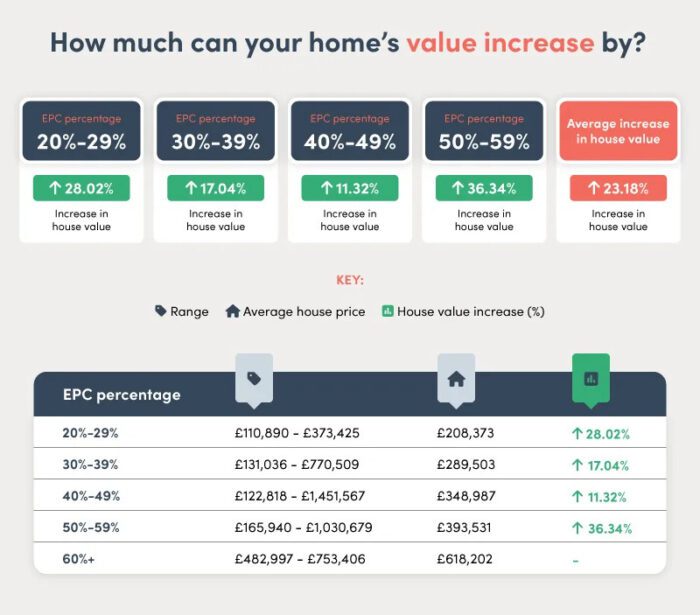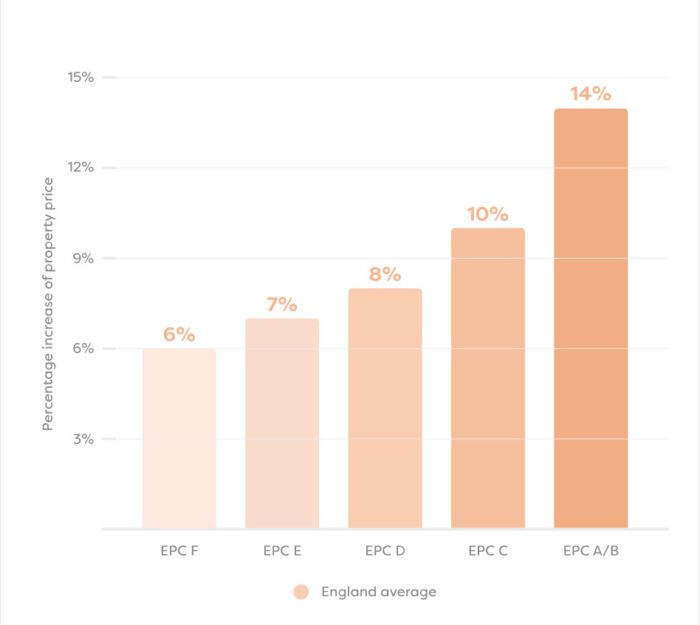If you’re trying to increase the value of your home there are plenty of choices available. Cleaning, a fresh paint job and even additions and remodeling are all fairly common strategies, however investing in the property’s energy efficiency rating could be an effective way to increase the value of your property. Whether the goal is to sell or simply to reduce your yearly bills by making some up-front investments can really pay off in the long run. Not to mention the current energy crisis in the UK, prospective buyers have already shown their prejudice towards energy efficient homes to cut down on energy bills.
A Tale of Two Properties
To see how this impacts things we’ll consider two possible properties. We’ll assume they reside on Shepherd Road in Lytham St Annes and are neighbours. Both properties share the identical footprint, however the differences regarding EPC rating is dramatic:
One property is has been rated with a “B”, while the other property has an “F”. Why do two properties that share similar footprints get distinct energy ratings? Furthermore is one more valuable than the other in the open market?
The property with a rating of ‘B’ is owned by a private individual and the property next door is leased to a large management company. In the past 3 years, the better rating property has seen significant changes and upgrades. The outdated, inefficient boiler is now replaced by an extremely effective ground source heating system, which comes with an extensive range of heating control. Wall insulation for external walls is now installed on the exterior of the house. The loft insulation levels have been significantly increased and this property is also equipped with an array of solar panels on the roof, which means homeowners can enjoy free electricity as well as government grants through Fee-in Tariff.
In the instance that of this energy efficient home we’re looking at future buyers will get the Renewable Heating Incentive payments, as well as the feed-in tariff payments that will be made for the remaining contract. This example may be a little extreme in that whilst the boiler was replaced with a new more energy efficient model, the largest impact for the “B” rating is the solar power system. Installation of solar is a large up-front investment, however it will pay dividends in terms of pay-in tarrifs, but the vast majority of homes in the UK don’t have solar energy installed. The point remains though that improving the glazing in windows (replacing single glazing with double or even triple glazing), installation of ceiling and wall insulation etc do have a large impact on your energy rating and therefore will improve the EPC rating and be more attractive to potential buyers.
We can draw similar conclusions when comparing other efficient/inefficient properties across Northamptonshire, Milton Keynes and the surrounding areas. It’s not uncommon to find properties – even when they are located close to one another and have differing levels of efficiency and general maintenance.
Does a higher EPC rating really increase the real value of my property?
To an a high EPC rating increase an investment value on my home? In a word it is yes. This is not specifically due to the EPC and more so due to the information it says on the properties (that it is properly maintained and made more energy effective). This is particularly true in older homes that have an excellent EPC rating (band C or higher).

infographic highlights the percentage difference between property prices and their EPC ratings.
Money Supermarket published an great article which includes guidance on the value of your home by improving its energy efficiency.
Each and every EPC providing this information is created and lodged by a Domestic Energy Assessor (DEA), and as the EPC continues to move towards the forefront of the housing market, the focus for these assessors is only increasing. If your EPC has expired, or if you have made significant improvements to your property’s energy efficiency it would be a good time to use the Go Local EPC Assessor Search tool, here.
When you’re looking to buy a home, don’t be hesitant about the information provided in the EPC It can reveal an enormous amount about the property examining it closely. It will help you compare similar properties quickly. It is important to note that the EPC is not needed every 10 years, but the process is in consultation for a reduction to 5 years. Therefore, you should be aware that an EPC on the home you’re considering could no longer be valid.

